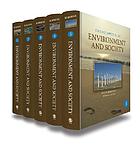Building context (and recognizing when you need more context) is an important element in the research process. Tertiary sources, especially subject encyclopedias, are often the best place to start when you are trying to establish some basic historical, social, or cultural context.
Articles in subject encyclopedias are written by scholars who have deep specialization in the topic and the articles themselves go through a stringent editing process. You usually can expect to find the following important information in articles in subject encyclopedias:
In Collins Library, the print reference collection is located on the first floor, and most of the online reference collection is available in one of the database collections listed below. Use Primo to identify subject encyclopedias in either format; or ask a librarian for recommendations.
 Encyclopedia of Environment and Society by Paul Robbins
Encyclopedia of Environment and Society by Paul RobbinsNot sure where to look? Each of these online collections will introduce you to a wealth of encyclopedias, dictionaries, and other tertiary sources.